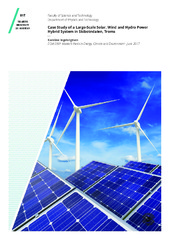Modeling and Stability Analysis of Fuel Cell-Based Marine Hybrid Power Systems
Permanent link
https://hdl.handle.net/10037/34963Date
2024-10-18Type
Journal articleTidsskriftartikkel
Peer reviewed
Author
Shakeri, Nastaran; Chen, Wenjie; Zadeh, Mehdi; Abdelhakim, Ahmed; Sørensen, Asgeir Johan; Tai, KangAbstract
This article proposes a framework for stability analysis of hydrogen fuel cell-based hybrid power systems (HPSs) for zero-emission propulsion. An analytical model is developed, and a comprehensive modal analysis is performed to address the HPS dynamic interactions. Sensitivity analysis assesses the impact of operating conditions, control parameters of the governor and converter controllers, and different control strategies. The case studies focus on how the parameters of the HPS state variables are coupled with the HPS modes through participation factors (PFs), thereby emphasizing which system state participates in determining the system’s dynamics. The modal analysis characterizes the influence of control parameters on poorly damped modes and enables the expansion of the stable operating region of the HPS by appropriate control parameter selection. The results indicate a notable impact of the voltage-control loop parameters on the system stability, a strong coupling between the subsystems’ current state variables and dc bus voltage dynamics, and a strong coupling between the governor dynamics and the FC current state. In addition, the study demonstrates a PF of 0.9 between the dc bus voltage and the HPS’s critical modes within 15% deviation by changes in the voltage controller’s proportional gain. Finally, analytical analysis and time-domain simulations are validated with a real-time hardware-in-the-loop (HIL) test setup.
Publisher
IEEECitation
Shakeri, Chen, Zadeh, Abdelhakim, Sørensen, Tai. Modeling and Stability Analysis of Fuel Cell-Based Marine Hybrid Power Systems. IEEE Transactions on Transportation Electrification. 2024;10(3):5075-5091Metadata
Show full item recordCollections
Copyright 2024 The Author(s)
Related items
Showing items related by title, author, creator and subject.
-
Maximum Available Power of Undersea Capacitive Coupling in a Wireless Power Transfer System
Al-Sallami, Hussein; Hoff, Bjarte; Østrem, Trond (Journal article; Tidsskriftartikkel; Peer reviewed, 2021-06-23)This paper studies the maximum available power of a dissipative capacitive power transfer (CPT) system submerged in seawater. The CPT system's maximum power capability is driven using the network theory, precisely the conjugate-image approach. The equations of the maximum available load power and the system's corresponding efficiency are expressed as a function of the capacitive coupling parameters. ... -
Case study of a large-scale solar and wind power hybrid system at Fakken Wind Farm, Troms
Tiller, Charlotte (Master thesis; Mastergradsoppgave, 2017-06-01)The objective of this thesis is to investigate the feasibility of a large scale hybrid system at Fakken, Troms. There is already an existing 54 MW wind farm at site. The wind farm has considerably higher power production during winter compared to summer, and the electricity grid is therefore not fully exploited during summer. Adding a solar panel utility to the site could be a solution to this issue. ... -
Case study of a large-scale solar, wind and hydro power hybrid system in Skibotndalen, Troms
Ingebrigtsen, Karoline (Master thesis; Mastergradsoppgave, 2017-06-06)The power company Troms Kraft is interested in the feasibility of a large-scale hybrid system in Skibotndalen in Troms. There are two existing hydro power stations in the area, and this thesis concerns the addition of an electric solar power plant of 20 MW and a wind power plant of 21 MW to these stations. As measured solar radiation is not available for one whole year at the location, solarradiation ...


 English
English norsk
norsk


